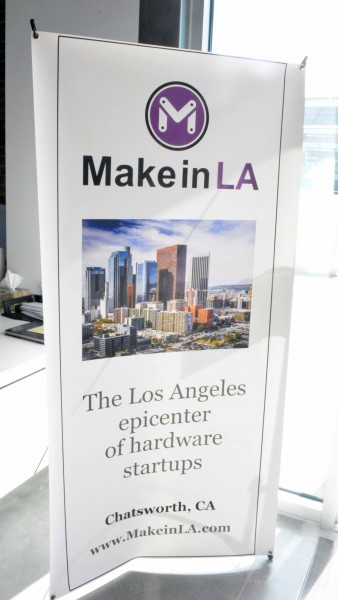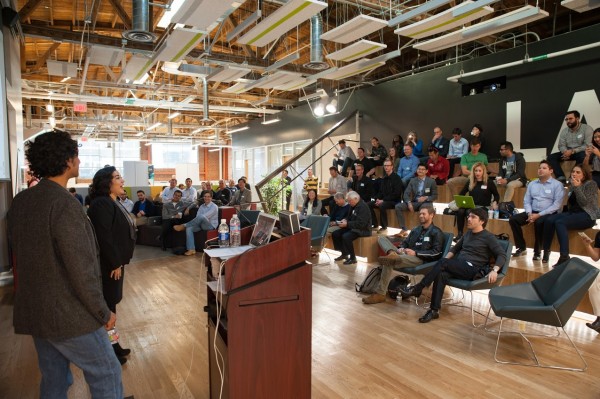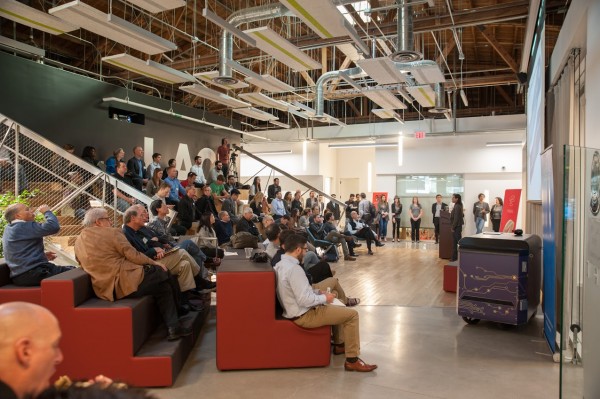by Dot Cannon
“The day has arrived,” said someone in the lobby of Los Angeles Cleantech Incubator.
Indeed, this was it–the goal towards which everyone had been working.
“The day” was Wednesday, January 13th–the first “Hardware Demo Day” for new hardware accelerator Make In LA! Today, their inaugural class of hardware startups would showcase their products to potential investors and media.
While Make In LA is Los Angeles’ first hardware accelerator, the term “hardware accelerator” seems barely to do them justice.
Make In LA, which opened its doors in August, 2015, selects promising entrepreneurs to enroll in a four-month class, with the goal of accelerating their business. Chosen startups receive mentoring, access to production facilities and an initial investment in their products. Classes happen in Make In LA’s Chatsworth facility, and tend to be very innovative.
“We even have a firetruck,” said Make In LA co-founder Noramay Cadena, in her opening remarks. Noramay, who is a mechanical engineer and STEM mentor (she’s the founder of the Latinas in STEM Founder Foundation), had had the concept of creating an accelerator for startups for many years, as had co-founder Shaun Arora.
“We wanted to do something that would give entrepreneurs a fair shot at being successful,” Shaun explained.
Noramay and Shaun started their first Make In LA class in September. For their first group of students, January 13th was graduation day.
“The forty-seven percent of athletes who stay on the field, after receiving a head impact, are the problem,” Force Impact Technologies CEO Anthony Gonzales told the gathered audience, during the first presentation of the afternoon.
Anthony and Force Impact Technologies COO Bob Merriman had come up with the solution to that problem: the FITGuard™, a head-injury awareness mouthguard.
How it works: after a head impact, the FITGuard™ lights up. Its color will indicate the severity of the impact: green for low risk; blue for moderate and red for severe risk.
Bob and Anthony, who are both athletes, said the FITGuard™ did not diagnose concussion. “We’re simply trying to call attention to the hard impacts officials may have missed,” Bob said.
Next up was George Eleftheriou, Co-founder and CEO of Sentio Solutions, with the Feel–a wearable wristband that tracks the wearer’s emotions throughout the day.
“How is that different from a mood ring?” was one of the questions he received during the Q and A session following his presentation.
“It’s nothing like a mood ring,” he responded, smiling.
(Indeed, while mood rings were a 1970s novelty, this wearable provides real-time alerts, an emotional wellness journal and personalized recommendations for increasing the wearer’s happiness.)
After a mini-break, that afternoon, came four startup “L.A. Ecosystem Pitches”.
Two of them hit upon one of our favorites–coffee! The SimpliPress is a redesigned French press, engineered to be less messy and to cut coffeemaking time approximately in half: French-pressed coffee in two to three minutes.
Meanwhile, Spinn Coffee is a coffee brewer that connects to wi-fi, and uses centrifugal force to brew coffee, rather than pods or filters.
The Gnarbox is one to which a lot of us will be looking forward, too. This device allows users to edit and share HD video content in real time!
And In Spirit Cocktails provide “the first craft cocktail available at grocery stores and other locations”, according to the presentation by In Spirit CEO Lawrence Cisneros. He showed the audience his device–a separate chamber that can extend the shelf life of juice for cocktails–from three to forty-five days.
Parents, educators and skateboarders would all be intrigued by the final two full-length presentations of the day.
Plobot, a programmable robot for children ages 4 and up, was the next product previewed. Unfortunately, the creator of Plobot had other commitments and couldn’t be onsite. However, he’d produced a video, outlining the ways the robot taught programming. Among the exciting things happening with Plobot: workshops taught at schools, according to their blog!
The program ended with a grand finale.
Flipmotion, Inc. CEO and co-founder Jibin Jose had started his presentation by telling the audience he was an avid skateboarder. “On my tenth birthday, I asked my father if I could get a skateboard,” he said.
However, at that time, in the area of India in which he lived, there was no demand for skateboards. Jibin said he had to wait two weeks to receive the promised gift.
“From that day, with my skateboard in my hand, I became the rock star of the neighborhood,” he said.
His passion for skateboarding led Jibin to create the RideBlock. Jibin and his team had gone to Long Beach and to Venice, he said, and talked with skateboarders to determine what would most help them improve their tricks.
But Jibin didn’t merely talk about the ways his creation worked.
In this demonstration featuring a pro skateboarder, Jibin showed the audience how RideBlock provided trick analysis, to help him improve his performance.
Make in LA’s first “Hardware Demo Day” ended with teams and mentors giving themselves a well-deserved round of applause–and with information on their upcoming sessions.
Their next four-month class starts in March. In her closing remarks, just prior to networking over desserts, Noramay told the audience that the incoming teams would include more female inventors and entrepreneurs.
“We’re proud to say there’s a 50/50 split,” she said.
For the second class, Noramay told the audience, Make In LA had received 112 applications. Of those, four maker teams had been selected.
If this first “Hardware Demo Day” is any indication, they’re in for a ride no one would want to miss.
Make In LA will start accepting applications in late April for their third set of class sessions, according to their website.

















